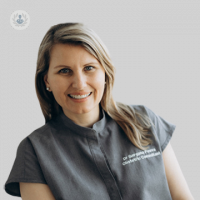First trimester screening tests: An expert guide
Written by:In this informative article, highly respected consultant obstetrician and foetal medicine specialist Dr Gergana Peeva shares her expert insight on screening tests performed during the first trimester of pregnancy. The revered specialist additionally discusses safety concerns and reveals when further testing is indicated.

Screening tests during the first trimester
The non-invasive prenatal test and the combined first trimester test are two different prenatal screening tests, which can identify whether your baby is at high or low risk of having trisomy 21 (Down's syndrome), trisomy 18 (Edwards' syndrome) or trisomy 13 (Patau's syndrome). Because these are screening tests, they cannot make a definitive diagnosis, hence the results are reported as probability of occurrence. If results indicate an increased risk, a foetal medicine specialist will discuss your options for a diagnostic test to confirm the diagnosis.
The non-invasive prenatal test involves a blood sample taken from your arm and does not carry any risk of miscarriage. The test can be performed from 10 weeks gestation onwards throughout the pregnancy. This test is 99 per cent accurate in identifying babies with trisomy 21, 98 per cent for babies with trisomy 18, and 90 per cent for babies with trisomy 13. If the non-invasive prenatal test shows that there is a low chance your baby has trisomy 21 or 18 or 13, it is unlikely that your baby has one of these conditions (the odds are less than 1 in 10,000). The non-invasive test can be used to determine the sex of the baby as well as the rhesus status.
The combined first trimester test comprises a measurement of the skin fold on the back of the baby’s neck called nuchal translucency and a maternal blood test measuring the concentration values of two hormones produced by the placenta (HCG and PAPP-A). It is offered between 11+3 and 13+6 weeks of gestation. This test is slightly less accurate than the non-invasive prenatal test in identifying babies with trisomy 21, trisomy 18, and trisomy 13 with detection rate of about ninety per cent and false positive rate of five per cent. Hence, if you have already had a non-invasive prenatal test (such as the Harmony test) showing a low-risk result, you do not require the full combined screening test. However, a detailed first trimester scan with measurement of nuchal translucency is still highly recommended to screen for other abnormalities beyond the screening covered by the non-invasive prenatal testing, such as other genetic conditions or heart abnormalities.
Since the risk assessment of both tests is based on different approach, there is a significant discrepancy in the risk results, usually indicating higher risk on the combined first trimester screening test. Since the non- invasive prenatal test is superior in its detection rate for trisomy 21, trisomy 18 and trisomy 13, performing the full combined screening test with measurement of HCG and PAPP-A is not useful, moreover this often creates misunderstandings and unnecessary worries.
In summary, the recommended approach in combining both tests for the optimal performance of the screening would be non-invasive screening at 10 weeks gestation combined with first trimester scan evaluating the nuchal translucency as well as the foetal anatomy at 13 weeks. The Women’s Wellness Centre, where I see patients in private practice, offers prenatal screening packages so please get in touch to schedule an appointment.
When is further testing indicated?
High-risk results on the non-invasive prenatal test, abnormal measurements of the nuchal translucency or detection of any other structural defects, which can be associated with genetic conditions are an indication for a diagnostic test: chorion villus sampling (CVS) and amniocentesis. Both of these tests involve the insertion of a needle into the maternal abdomen and are therefore considered invasive. The risk of miscarriage due to CVS or amniocentesis is very low. If you were to miscarry due to the test, this would happen within the next five days.
The CVS involves an examination of placental tissue (chorionic villi) and is performed usually between 11 and 16 weeks of gestation. Amniocentesis involves the examination of cells in the fluid from around the foetus (amniotic fluid). The test is safe to be performed after 16 weeks gestation.
To schedule a consultation or prenatal screening appointment with Dr Peeva, visit her Top Doctors profile today.


